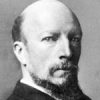Let us learn from the lips of death the lessons of life. Let us live truly while we live, live for what is true and good and lasting. And let the memory of our dead help us to do this. For they are not wholly separated from us, if we remain loyal to them. In spirit they are with us. And we may think of them as silent, invisible, but real presences in our households.
Felix Adler (1851-1933) German-American educator
Life and Destiny, Lecture 8 “Suffering and Consolation” (1903)
(Source)
Quotations about:
spirits
Note not all quotations have been tagged, so Search may find additional quotes on this topic.
Salamander, gleam candescent!
Thou, Undine, shalt wreathe and coil!
Sylph, disperse thee evanescent!
Goblin, thou shalt toil and moil![Salamander, soll glühen,
Undene sich winden,
Sylphe verschwinden,
Kobold sich mühen.]Johann Wolfgang von Goethe (1749-1832) German poet, statesman, scientist
Faust: a Tragedy [eine Tragödie], Part 1, sc. 6 “The Study,” l. 1304ff [Faust] (1808-1829) [tr. Latham (1908)]
(Source)
Some translations (and this site) include the Declaration, Prelude on the Stage, and Prologue in Heaven as individual scenes; others do not, leading to their Part 1 scenes being numbered three lower.
"The Spell of Four Elements" or "Fourfold Spell" [Spruch der Viere]. (Source (German)). Alternate translations:
Salamander must be glowing,
Undine self-coiling,
Sylph vanish in going,
Kobold keep toiling.
[tr. Priest (1808)]
Salamander shall glow,
Undine twine,
Sylph vanish,
Kobold be moving.
[tr. Hayward (1831)]
Salamander shall kindle,
Writhe nymph of the wave,
In air sylph shall dwindle,
And Kobold shall slave.
[tr. Swanwick (1850)]
Salamander shall glisten,
Undina lapse lightly,
Sylph vanish brightly,
Kobold quick listen.
[tr. Brooks (1868)]
Salamander, shine glorious!
Wave, Undine, as bidden!
Sylph, be thou hidden!
Gnome, be laborious!
[tr. Taylor (1870)]
Let the Salamander glow,
Undene twine her crested wave,
Silphe into ether flow,
And Kobold vex him, drudging slave!
[tr. Blackie (1880)]
Salamander shall broil,
Undene shall grieve,
Sylphe shall leave,
Kobold shall toil.
[tr. Kaufmann (1961)]
Glow, Salamander
Undine, coil
Sylph, meander
Kobold, toil.
[tr. Salm (1962)]
Let Salamander flare,
Undine coil,
Sylph thin to air,
Hobgoblin toil.
[tr. Arndt (1976)]
Salamander, burn!
Water-nymph, twist and turn!
Sylph of the air, dissolve!
Goblin, dig and delve
[tr. Luke (1987)]
Salamander, glow hot,
Undine, wind about,
Sylph vanish quick,
Kobold, to work
[tr. Greenberg (1992)]
Salamanders aglow,
Undines so fair,
Sylphs of the air,
Kobolds below!
[tr. Williams (1999), l. 1273ff]
Salamander, be glowing,
Undine, flow near,
Sylph, disappear,
Gnome, be delving.
[tr. Kline (2003)]
Angels are souls blown into lights,
Jinn are souls blown into winds,
and Human Beings are souls blown into shapes.Ibn 'Arabi (1165-1240) Arab Andalusian Muslim scholar, Sufi mystic, poet, philosopher [ابن عربي]
(Attributed)
(Source)
I wish to see this beverage become common instead of the whisky which kills one-third of our citizens and ruins their families.
Thomas Jefferson (1743-1826) American political philosopher, polymath, statesman, US President (1801-09)
Letter to Charles Yancey (6 Jan 1816)
(Source)
On beer.
GLENDOWER: I can call spirits from the vasty deep.
HOTSPUR: Why, so can I, or so can any man;
But will they come when you do call for them?William Shakespeare (1564-1616) English dramatist and poet
Henry IV, Part 1, Act 3, sc. 1, l. 55ff (3.1.55-57) (1597)
(Source)
Chi-lu asked how the spirits of the dead and the gods should be served. The Master said, “You are not able even to serve man. How can you serve the spirits?”
[季路問事鬼神。子曰、未能事人、焉能事鬼。]
Confucius (c. 551- c. 479 BC) Chinese philosopher, sage, politician [孔夫子 (Kǒng Fūzǐ, K'ung Fu-tzu, K'ung Fu Tse), 孔子 (Kǒngzǐ, Chungni), 孔丘 (Kǒng Qiū, K'ung Ch'iu)]
The Analects [論語, 论语, Lúnyǔ], Book 11, verse 12 (11.12) (6th C. BC – AD 3rd C.) [tr. Lau (1979)]
(Source)
Brooks (below) suggests that this passage was interpolated into Book 11 around the time of Book 16. This analect was originally numbered 11.11 by Legge and other early translators (as noted below). (Source (Chinese)). Alternate translations:
Chi Lu asked about serving the spirits of the dead. The Master said, "While you are not able to serve men, how can you serve their spirits?"
[tr. Legge (1861), 11.11]
Tszlu propounded a question about ministering to the spirits ((of the departed). The Master replied, "Where there is scarcely the ability to minister to living men, how shall there be ability to minister to the spirits?"
[tr. Jennings (1895), 11.11]
A disciple (the intrepid Chung Yu) enquired how one should behave towards the spirits of dead men. Confucius answered, "We cannot as yet do our duties to living men; why should we enquire about our duties to dead men?"
[tr. Ku Hung-Ming (1898), 11.11]
When Chi Lu asked about his duty to the spirits the Master replied: "While still unable to do your duty to the living, how can you do your duty to the dead?"
[tr. Soothill (1910), 11.11]
Chi Lu asked about the service for ghosts and spirits. Confucius said, You cannot be useful to the living, how can you be useful to (serve) ghosts?
[tr. Pound (1933), 11.11]
Tsu-lu asked how one should serve ghosts and spirits. The master said, Till you have learnt to serve men, how can you serve ghosts?
[tr. Waley (1938), 11.11]
You can’t treat spirits and divinities properly before you are able to treat your fellow men properly.
[tr. Ware (1950)]
Zilu asked about serving ghosts and spirits. The Master said: "If one is not yet capable of serving men, how can one serve ghosts?"
[tr. Dawson (1993)]
Zilu asked how to serve the spirits and gods. The Master said: "You are not yet able to serve men, how could you serve the spirits?"
[tr. Leys (1997)]
When Ji-lu asked how to serve the spirits and gods, the Master said, "You cannot serve men yet; how can you serve the spirits?"
[tr. Huang (1997)]
Jilu asked how to service the gods, Confucius said: "One could not service the human beings yet, how could one service the gods?"
[tr. Cai/Yu (1998), #272]
Zilu asked how to serve the spirits and the gods. The master replied, "Not yet being able to serve other people, how would you be able to serve the spirits?"
[tr. Ames/Rosemont (1998)]
Jì-Lì asked about serving ghosts and spirits. The Master said, You cannot yet serve men, how could you serve ghosts?
[tr. Brooks/Brooks (1998)]
When Adept Lu asked about serving ghosts and spirits, the Master said, "You haven't learned to serve the living, so how could you serve ghosts?"
[tr. Hinton (1998)]
Zilu asked about serving ghosts and spirits. The Master said, “You are not yet able to serve people -- how could you be able to serve ghosts and spirits?”
[tr. Slingerland (2003)]
Jilu asked how one should serve the gods and spirits. The Master said, "When you don't yet know how to serve human beings, how can you serve the spirits?"
[tr. Watson (2007)]
Jilu [Zilu] asked about how to serve the spirits of the dead and the gods. The Master said, "You can't even serve men properly, how can you serve the spirits?"
[tr. Annping Chin (2014)]
Ji Lu asked about how to serve and worship gods and spirits. Confucius said, "You still have not served men well. Why do you bother serving gods and spirits?"
[tr. Li (2020)]
If you don't know how to serve men, why worry about serving the gods?
[Common translation]






